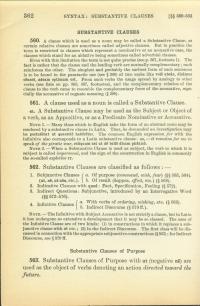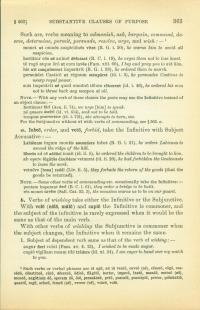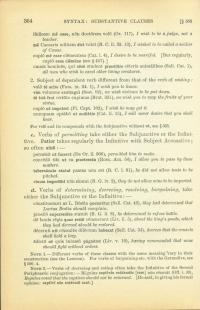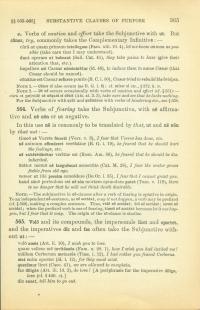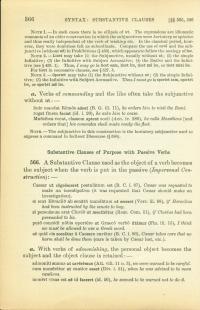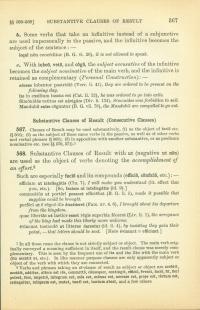563. Substantive Clauses of Purpose with ut (negative nē) are used as the object of verbs denoting an action directed toward the future. Such are, verbs meaning to admonish, ask, bargain, command, decree, determine, permit, persuade, resolve, urge, and wish.1
Monet ut omnēs suspīciōnēs vītet. (B. G. 1.20)
He warns him to avoid all suspicion.
Hortātur eōs nē animō dēficiant. (B. C. 1.19)
He urges them not to lose heart.
Tē rogō atque ōrō ut eum iuvēs. (Fam. 13.66)
I beg and pray you to aid him.
Hīs utī conquīrerent imperāvit. (B. G. 1.28)
He ordered them to search.
Persuādet Casticō ut rēgnum occupāret.(id. 1.3)
He persuades Casticus to usurp royal power.
Suīs imperāvit nē quod omnīnō tēlum rēicerent. (id. 1.46)
He ordered his men not to throw back any weapon at all.
Note— With any verb of these classes the poets may use the Infinitive instead of an object clause.
hortāmur fārī. (Aen. 2.74)
We urge [him] to speak.
Nē quaere docērī. (id. 6.614)
Seek not to be told.
Temptat praevertere, etc. (id. 1.721)
She attempts to turn, etc.
For the subjunctive without ut with verbs of commanding, see § 565.a (below).
a. Iubeō (order) and vetō (forbid) take the Infinitive with Subject Accusative.
Labiēnum iugum montis ascendere iubet (B. G. 1.21)
He orders Labienus to ascend the ridge of the hill.
līberōs ad sē addūcī iussit (id. 2.5)
He ordered the children to be brought to him.
ab opere lēgātōs discēdere vetuerat (id. 2.20)
He had forbidden the lieutenants to leave the work.
Vetuēre [bona] reddī. (Liv. 2.5)
They forbade the return of the goods.
(that the goods be returned)
Note— Some other verbs of commanding, etc., occasionally take the Infinitive.
Pontem imperant fierī. (B. C. 1.61)
They order a bridge to be built.
Rēs monet cavēre. (Sall. Cat. 52.3)
The occasion warns us to be on our guard.
b.Verbs of wishing take either the infinitive or the subjunctive. With volō (nōlō, mālō) and cupiō the infinitive is commoner, and the subject of the infinitive is rarely expressed when it would be the same as that of the main verb. With other verbs of wishing the Subjunctive is commoner when the subject changes, the infinitive when it remains the same.
-
Subject of dependent verb different same as that of the verb of wishing.
Augur fierī voluī. (Fam. 15.4.13)
I wished to be made augur.Cupiō vigiliam meam tibi trādere. (id. 11.24)
I am eager to hand over my watch to you.Iūdicem mē esse, nōn doctōrem volō. (Or. 117)
I wish to be a judge, not a teacher.Mē Caesaris mīlitem dīcī voluī. (B. C. 2.32.13)
I wished to be called a soldier of Cæsar.Cupiō mē esse clēmentem. (Cat. 1.4)
I desire to be merciful.
[But regularly, cupiō esse clēmēns (see § 457)]omnēs hominēs, quī sēsē student praestāre cēterīs animālibus (Sall. Cat. 1)
all men who wish to excel other living creatures -
Subject of dependent verb different from that of the verb of wishing.
Volō tē scīre. (Fam. 9.24.1)
I wish you to know.Vim volumus exstinguī. (Sest. 92)
We wish violence to be put down.Tē tuā fruī virtūte cupimus. (Brut. 331)
We wish you to reap the fruits of your virtue.Cupiō ut impetret. (Pl. Capt. 102)
I wish he may get it.Numquam optābō ut audiātis. (Cat. 2.15)
I will never desire that you shall hear.
For volō and its compounds with the subjunctive without ut, see § 565 (below).
c. Verbs of permitting take either the subjunctive or the infinitive. Patior takes regularly the infinitive with subject accusative; so often sinō.
permīsit ut faceret (De Or. 2.366)
permitted him to make
Concēdō tibi ut ea praetereās. (Rosc. Am. 54)
I allow you to pass by these matters.
Tabernācula statuīpassus nōn est. (B. C. 1.81)
He did not allow tents to be pitched.
Vīnum importārī nōn sinunt. (B. G. 4.2)
They do not allow wine to be imported.
d. Verbs of determining, decreeing, resolving, bargaining, take either the subjunctive or the infinitive.
cōnstituerant ut L. Bēstia quererētur. (Sall. Cat. 43)
They had determined that Lucius Bestia should complain.
Proeliō supersedēre statuit. (B. G. 2.8)
He determined to refuse battle.
dē bonīs rēgis quae reddī cēnsuerant (Liv. 2.5)
about the king's goods, which they had decreed should be restored
dēcernit utī cōnsulēs dīlēctum habeant (Sall. Cat. 34)
decrees that the consuls shall hold a levy
ēdictō nē quis iniussū pūgnāret (Liv. 5.19)
having commanded that none should fight without orders
Note 1— Different verbs of these classes with the same meaning vary in their construction (see the Lexicon). For verbs of bargaining, etc., with the Gerundive, see § 500.4.
Note 2— Verbs of decreeing and voting often take the infinitive of the 2nd periphrastic conjugation.
Rēgulus captīvōs reddendōs [esse] nōn cēnsuit. (Off. 1.39)
Regulus voted that the captives should not be returned.
[He said, in giving his formal opinion: captīvī nōn reddendī sunt.]
e. Verbs of caution and effort take the subjunctive with ut. But cōnor (try) commonly takes the complementary infinitive.
Cūrā ut quam prīmum intellegam. (Fam. 13.10.4)
Let me know as soon as possible (take care that I may understand).
Dant operam ut habeant, etc., (Sall. Cat. 41)
They take pains to have
(give their attention that, etc.)
impellere utī Caesar nōminārētur (id. 49)
to induce them to name Cæsar
(that Cæsar should be named)
Cōnātus est Caesar reficere pontīs. (B. C. 1.50)
Cæsar tried to rebuild the bridges.
Note 1— Cōnor sī also occurs (as B. G. 1.8); cf. mīror sī, etc., § 572.b, Note.
Note 2— Ut nē occurs occasionally with verbs of caution and effort (cf. § 531).
Cūrā et prōvidē ut nēquid eī dēsit. (Att. 11.3.3)
Take care and see that he lacks nothing.
For the subjunctive with quīn and quōminus with verbs of hindering etc., see § 558.
564. Verbs of fearing take the subjunctive, with nē affirmative and nē nōn or ut negative. In this use nē is commonly to be translated by that, ut and nē nōn by that not.
Timeō nē Verrēs fēcerit, etc. (Verr. 5.3)
I fear that Verres has done, etc.
Nē animum offenderet verēbātur, etc. (B. G. 1.19)
He feared that he should hurt the feelings, etc.
Nē exhērēdārētur veritus est. (Rosc. Am. 58)
He feared that he should be disinherited.
Ōrātor metuō nē languēscat senectūte. (Cat. M. 28)
I fear the orator grows feeble from old age.
Vereor ut tibi possim concēdere. (De Or. 1.35)
I fear that I cannot grant you.
Haud sānē perīculum est nē nōn mortem optandam putet. (Tusc. 5.118)
There is no danger that he will not think death desirable.
Note— The subjunctive in nē clauses after a verb of fearing is optative in origin. To an independent nē sentence:
Nē accidat.
May it not happen.
A verb may be prefixed (cf. § 560), making a complex sentence. Thus, vidē nē accidat; ōrō nē accidat; cavet nē accidat; when the prefixed verb is one of fearing, timeō nē accidat becomes Let it not happen, but I fear that it may. The origin of the ut clause is similar.
565. Volō and its compounds, the impersonals licet and oportet, and the imperatives dīc and fac often take the subjunctive without ut.
Volō amēs. (Att. 2.10)
I wish you to love.
Quam vellem mē invītāssēs! (Fam. 10.28.1)
How I wish you had invited me!
Māllem Cerberum metuerēs (Tusc. 1.12)
I had rather you feared Cerberus.
Sint enim oportet. (id. 1.12)
For they must exist.
Querāmur licet (Caec. 41)
We are allowed to complain.
Fac dīligās! (Att. 3.13.2)
Do love!
[A periphrasis for the imperative dīlige love (cf. § 449.c).]
Dīc exeat. Tell him to go out.
Note 1— In such cases there is no ellipsis of ut. The expressions are idiomatic remnants of an older construction in which the subjunctives were Hortatory or Optative and thus really independent of the verb of wishing etc. In the classical period, however, they were doubtless felt as subordinate. Compare the use of cavē and the subjunctive (without nē) in prohibitions (§ 450), which appears to follow the analogy of fac.
Note 2— Licet may take (1) the subjunctive, usually without ut; (2) the simple infinitive; (3) the infinitive with subject accusative; (4) the dative and the infinitive (see § 455.1). Thus, I may go is licet eam, licet īre, licet mē īre, or licet mihi īre.
For licet in concessive clauses, see § 527.b.
Note 3— Oportet may take (1) the subjunctive without ut; (2) the simple infinitive; (3) the infinitive with subject accusative. Thus I must go is oportet eam, oportet īre, or oportet mē īre.
a. Verbs of commanding and the like often take the subjunctive without ut.
Huic mandat Rēmōs adeat. (B. G. 3.11)
He orders him to visit the Remi.
Rogat fīnem faciat. (id. 1.20)
He asks him to cease.
Mnēsthea vocat, classem aptent sociī. (Aen. 4.289)
He calls Mnestheus [and orders that] his comrades shall make ready the fleet.
Note— The subjunctive in this construction is the Hortatory Subjunctive used to express a command in indirect discourse (§ 588).
Substantive Clause of Purpose with Passive Verbs
566. A substantive clause used as the object of a verb becomes the subject when the verb is put in the passive (Impersonal Construction).
Caesar ut cōgnōsceret postulātum est. (B. C. 1.87)
Cæsar was requested to make an investigation.
(it was requested that Cæsar should make an investigation)
sī erat Hēracliō ab senātū mandātum ut emeret (Verr. 3.88)
if Heraclius had been instructed by the senate to buy
sī persuāsum erat Cluviō ut mentīrētur (Rosc. Com. 51)
if Cluvius had been persuaded to lie
Putō concēdī nōbīs oportēre ut Graecō verbō ūtāmur. (Fin. 3.15)
I think we must be allowed to use a Greek word.
Nē quid eīs noceāturā Caesare cavētur. (B. C. 1.86)
Cæsar takes care that no harm shall be done them
(care is taken by Cæsar lest, etc.).
a. With verbs of admonishing, the personal object becomes the subject and the object clause is retained.
Admonitī sumus ut cavērēmus. (Att. 8.11 D. 3)
We were warned to be careful.
cum monērētur ut cautior esset (Div. 1.51)
when he was advised to be more cautious
Monērī vīsus est nē id faceret. (id. 56) He seemed to be warned not to do it.
b. Some verbs that take an infinitive instead of a subjunctive are used impersonally in the passive, and the infinitive becomes the subject of the sentence.
Loquī nōn concēditur. (B. G. 6.20)
It is not allowed to speak.
c. With iubeō, vetō, and cōgō, the subject accusative of the infinitive becomes the subject nominative of the main verb, and the infinitive is retained as complementary (Personal Construction).
Adesse iubentur postrīdiē. (Verr. 2.41)
They are ordered to be present on the following day.
Īre in exsilium iussus est. (Cat. 2.12)
He was ordered to go into exile.
Simōnidēs vetitus est nāvigāre. (Div. 2.134)
Simonides was forbidden to sail.
Mandubiī exīre cōguntur. (B. G. 7.78)
The Mandubii are compelled to go out.

